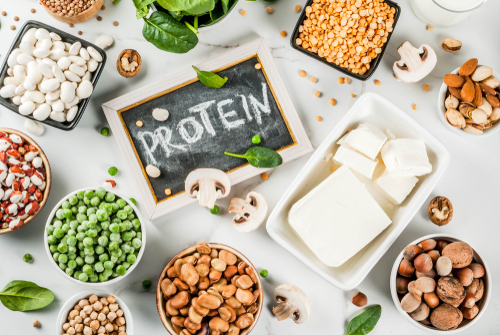But You Need Meat!!!
There’s always such a sense of concern and urgency in their voices. Genuine fear that you’re not only depriving your body of essential protein but that you’re also putting your greater health at risk. Who knew becoming a vegetarian or vegan could cause such confusion!?! When someone catches wind of my transition to a plant based lifestyle, this is generally how the conversation goes, “You don’t eat meat?? Nope. What about chicken?? No. Fish?? Nope. But you need protein!!”. And yes, they’re absolutely right. You do need protein.
But somewhere along the line, as far as the general population is concerned, meat has become the only viable source of protein. Well, let me tell you, there’s a ton of options out there that can fit the bill!! Not only are they delicious but they can actually provide your body with an impressive amount of additional fibre, vitamins & minerals. Plant based proteins also contain lower cholesterol and saturated fat contents, which can be problematic with some meats. Another important added benefit to these different types of protein is that, unlike meat, they contribute to a more alkaline body, reducing irritation, inflammation and tissue degeneration. So let’s take a look at some of these alternative protein sources.
Beans & Peas
Beans, the musical fruits. Don’t let their reputation scare you away! Beans, as well as peas, are great sources of protein and fibre while being low in fat and calories. As an added bonus, these have also been known to help lower cholesterol levels. Throw some black, kidney, garbanzo (chickpeas) beans in family friendly recipes such as chilli or tacos to boost their nutritional values. Lentils can be easily incorporated into soups or spaghetti sauces. Green or wax beans, as well as soybeans can be added to salads or as a colourful side dish.
Nuts & Seeds
Seeds can be an easy addition to any diet. Some chia, hemp or flax seeds in your oatmeal or smoothies, a handful of pumpkin, sesame or sunflower seeds into salads or in baking. These little gems are a great way to add texture and containing around 30% protein, a little goes a long way. Nuts, containing anywhere from 5-20% protein, are very versatile. They can be made into nut butters, incorporated into meals such as stir fry, into delicious baked goods or as a simple snack.
Grains
Carb lovers rejoice!! Whole grains can help you reach your daily requirements. These can contain anywhere between 10-20% protein, depending on the type of grain you choose. And being complex carbohydrates, they provide slower burning energy that’ll help you power through your day. From such common options as corn, oats, wheat and quinoa, to some you might not be as familiar with like rye, millet, buckwheat and amaranth, there’s bound to be something that you’ll love.
Veggies
Yes, vegetables have protein. Very shocking I know. Mushrooms, depending on the variety, are made of 33% or more protein. Brussel sprouts are half protein. Cauliflower has 25% whereas broccoli and swiss chards have closer to 33%. Even potatoes are 10% protein. Many other veggies have protein, however, it’s in much smaller amounts. And, being low in calories and fat but high in water, vitamins and minerals, makes them a great addition to any diet.
Plant Based Protein Powders
Breaking news… Protein powders are not just for athletes. These can actually be very beneficial in providing not only protein but a multitude of additional important vitamins and minerals. They can be used as a meal replacement or in addition to your healthy diet. These protein powders can be made from brown rice, peas, hemp and pumpkin seeds.
These are just a few of the many additional protein options that are out there. I’ve chosen to focus some of the more common ones but tofu, tempeh and some vegan cheeses would also fall into this plant based group. If your looking for non meat options that aren’t necessarily vegan, whey protein powders, cheeses, greek yogurts and eggs are worth looking into.
By replacing meats and incorporating more of these alternative proteins, you can establish a more nutritiously diverse diet that provides your body with vitamins, minerals and phytonutrients that it might not ordinarily be getting. Well, there you have it, there are more protein options out there then just meat. Myth debunked.


